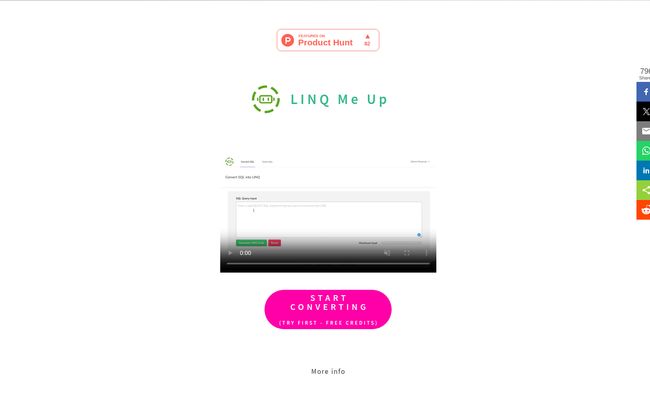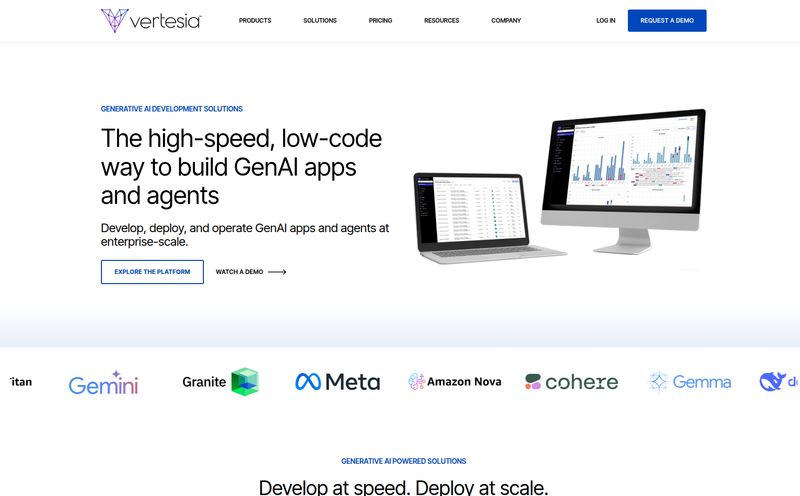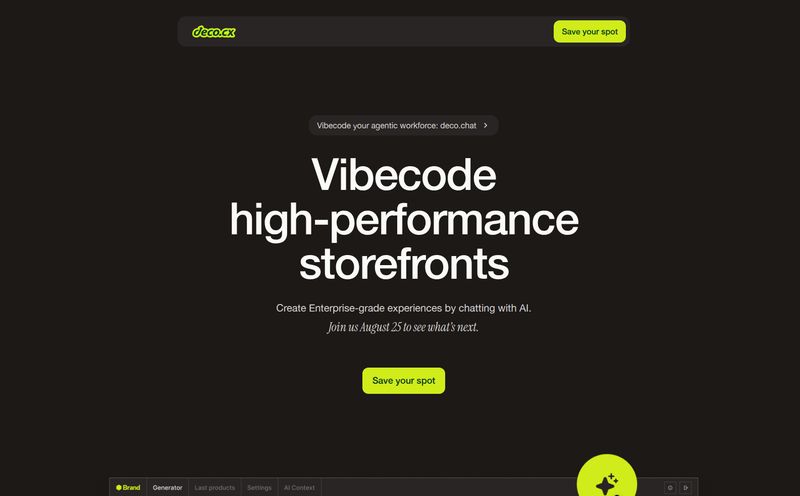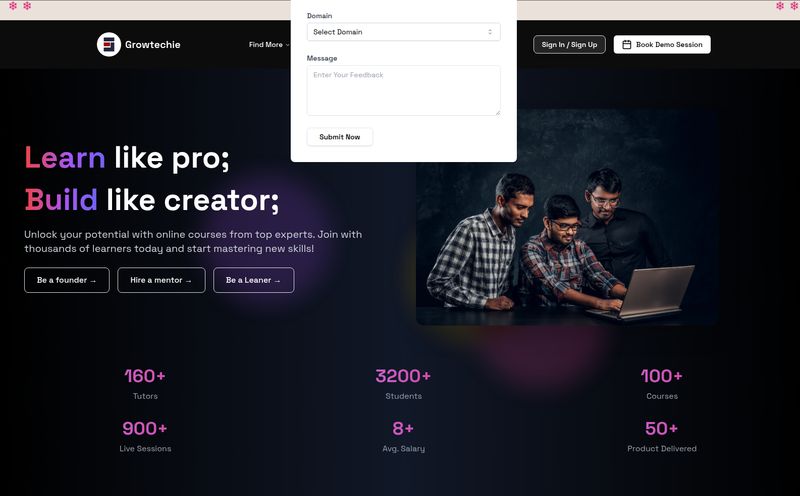If you're a .NET developer, you’ve been there. Staring at a perfectly good SQL query, maybe one you've painstakingly optimized in SQL Server Management Studio, and then facing the soul-crushing task of translating it, line by tedious line, into LINQ. Whether it's for Entity Framework or just general data manipulation, it's a chore. It’s the digital equivalent of being asked to translate a document into a language you only sort of speak. You can do it, but it’s slow, error-prone, and honestly, not the best use of your expensive brainpower.
I've spent more hours than I care to admit wrestling with complex joins, nested selects, and aggregate functions, trying to get my C# code to spit out the same results as my SQL script. It’s a classic productivity sink. Well, I recently stumbled across a tool that felt like it was built specifically to solve this exact headache: LINQ Me Up. And after kicking the tires on it for a while, I have some thoughts.
Spoiler alert: it’s pretty darn good.
So, What Exactly is LINQ Me Up?
In a nutshell, LINQ Me Up is an AI-powered converter that acts like a digital Rosetta Stone for database queries. Its main gig is converting raw SQL queries into clean, functional LINQ code. And it goes both ways, turning your LINQ back into readable SQL, which is incredibly useful for debugging or performance tuning.
But it doesn't stop there. One of its slickest features is the ability to generate LINQ queries from a dataset. You can feed it a chunk of JSON, some XML, or even a C# POCO (Plain Old CLR Object), and it will intelligently craft the LINQ needed to work with that data structure. For anyone working with APIs or varied data sources, that’s a massive time-saver.
This isn't just for C# purists, either. It supports both C# and Visual Basic, and it's flexible enough to handle both Method syntax (the one with all the dots and lambdas) and Query syntax (the one that looks a bit like SQL). So, no matter what your team's coding standard is, it's got you covered.
Why This Isn't Just Another Code Converter
I've seen my share of simple, rule-based converters over the years. They’re usually clunky, can't handle anything beyond a basic SELECT statement, and often produce code that... well, it technically works, but you wouldn't want to show it to your colleagues. This feels different.
The Time-Saving is Real and Measurable
The site throws out a pretty bold claim: turning a 30-minute manual conversion into a 5-minute task. My first thought was, “Yeah, right.” But after using it, that’s not far off. Think about it. For a moderately complex query, you're not just typing; you're thinking, debugging, running the app, checking the generated SQL with a profiler, and tweaking. It all adds up.
LINQ Me Up just… does it. You paste your SQL, click a button, and get your LINQ. The time saved isn't just a convenience, it translates directly into money. If your hourly rate is, say, $50 (which is conservative for many devs), saving 25 minutes on a single query is about a $41 savings. Do that a few times a week and teh tool pays for itself almost immediately.
It’s Surprisingly Versatile
I was initially just interested in the SQL-to-LINQ feature, but the other functions are what really sold me. Being able to generate a query from a JSON payload is fantastic for quick prototyping or building out new API endpoints. It helps you get from data structure to working code faster. The bidirectional conversion is also more useful than I first thought. It's a great way to verify that your complex LINQ statement is actually generating the efficient SQL you intended.
Using It Is Almost Laughably Simple
The process is about as straightforward as it gets. You don't need to install a hefty Visual Studio extension or some command-line tool you'll forget how to use in a week. It's a web-based tool.
- You pick what you want to do (e.g., SQL ⇢ LINQ).
- You paste your code or data into the input box.
- You click the big, bright “Generate” button.
- You copy the result.
That's it. The AI does the heavy lifting in the background, analyzing your input and spitting out an optimized result. It feels less like using a complex tool and more like asking a very smart, very fast junior dev for help.
Let's Talk Pricing: How Much Does This Magic Cost?
Okay, it's not free. And for a tool this useful, I wouldn't expect it to be. The pricing model is refreshingly flexible, which I appreciate. It’s not a one-size-fits-all situation.
| Plan Type | Cost | Best For |
|---|---|---|
| Monthly Subscription | $4.99 per month | Developers who need to do conversions regularly and want unlimited access without thinking about it. |
| Yearly Subscription | $50 per year | The power user. It's the same as the monthly plan but saves you about ten bucks over the year. The site calls it "POPULAR!" for a reason. |
| Credit Bundles | Starts at $1 per credit | The occasional user. If you only need to convert a tricky query once or twice a month, you can just buy a few credits and use them when needed. No recurring charge. |
I find this pricing model very fair. The subscription is a no-brainer for full-time .NET devs, while the credit system is perfect for freelancers or people who only dabble in projects that would need this. It shows the creator understands their audience isn't monolithic.
The Fine Print and A Dose of Realism
No tool is perfect, and it’s important to be honest about the downsides. First, yes, it's a paid tool. You can't just use it infinitely for free. Second, like many AI services, their privacy policy notes that the underlying AI service might use requests to help train its models. However, LINQ Me Up itself states they do not store or share your input, and that it's "for your eyes only." This is a standard distinction in the age of AI APIs.
Most importantly, and they say this themselves: you should always check and test the generated code before pushing to production. This isn’t a flaw; it's just common sense. You wouldn't blindly copy-paste a giant function from Stack Overflow into your mission-critical application without understanding it and testing it, right? The same logic applies here. This tool is a powerful assistant, not a replacement for a competent developer.
My Final Take: Is LINQ Me Up Worth Your Time and Money?
Absolutely. For the price of a fancy coffee once a month, you get a tool that can save you hours of frustrating, low-value work. The return on investment here is fantastic. It makes you faster, more efficient, and lets you focus on the bigger architectural problems instead of getting bogged down in translation boilerplate.
It's a sharp, focused tool that does exactly what it promises, and does it well. If you live in the .NET ecosystem, I think adding LINQ Me Up to your toolbox is an easy decision. It’s a perfect example of using AI for what it’s best at: automating the tedious stuff so we humans can get on with the creative work.
Frequently Asked Questions
Is there a free version of LINQ Me Up?
While there isn't a permanent free tier, the website often provides free credits to new users so you can try it out first. After that, you'll need to choose between a subscription or buying credit bundles.
What .NET languages does LINQ Me Up support?
It supports both C# and Visual Basic, which covers the vast majority of .NET developers out there.
How does LINQ Me Up handle my privacy and code?
The platform states clearly that they do not store or share the input you provide. The conversion is for your use only. It's always good practice not to paste highly sensitive, proprietary information into any online tool, but their privacy-first stance is reassuring.
Can I trust the generated code 100%?
You can trust it to be a very, very good starting point—often a perfect one. However, you should always review and test any AI-generated code before implementing it in a production environment. Treat it as a highly skilled pair programmer, not an infallible oracle.
What's the difference between a subscription and credits?
A subscription (monthly or yearly) gives you unlimited conversions for a flat fee, which is ideal for frequent users. Credits are a pay-as-you-go model where you buy a bundle of conversions to use whenever you need them, which is better for occasional use.
Can it convert really complex SQL queries?
In my experience, it handles surprisingly complex queries, including multiple joins, subqueries, and grouping. The AI-powered nature means it's much more capable than simple, rule-based converters. It's always worth pasting your query in to see how it performs!
Conclusion
In the constant search for better developer productivity, tools like LINQ Me Up are a breath of fresh air. They don't try to reinvent the wheel; they just make one of the bumpiest parts of the road incredibly smooth. By automating the monotonous task of SQL-to-LINQ conversion, it gives you back your most valuable asset: time. Give it a try; I have a feeling you'll wonder how you put up with doing it the old way for so long.




